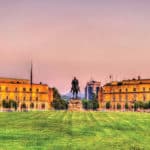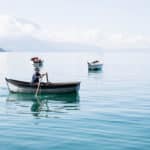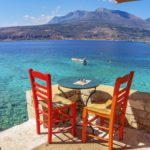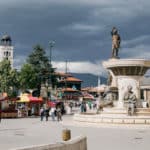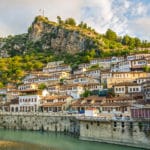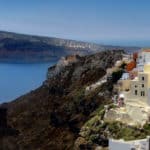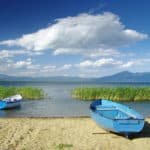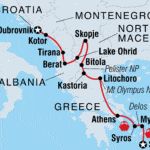Dubrovnik to Santorini
Wind your way down through some of Mediterranean Europe’s most charming towns, beaches and islands on this journey from the Adriatic to the Aegean. Start off with a tour of Dubrovnik’s enchanting walled city before heading south along the spectacular Dalmatian coast to Montenegro. Venture off the tourist trail for a taste of old-time Balkans in Albania and Macedonia, take time out in provincial Syros, and then eat, drink and sunbathe your way through the good times on offer in Mykonos and Santorini. A region of breathtaking scenery, legendary history and ever-enticing cuisine, this journey through Eastern Europe serves up a slice of the Mediterranean with a Balkans backdrop.
22 days, from
$4,772
per person
GROUP SIZE
ACTIVITY LEVEL
Details
Countries Visited:
Albania
Croatia
Greece
Macedonia, Republic Of
Montenegro
Accommodation: Hotel (17 nights), Guesthouse (2 nights), Homestay (1 night), Hostel (1 night)
Transportation: Public bus , Ferry , Private vehicle , Taxi , Metro
Included Meals:
- 17 breakfasts
- 1 dinners
Group size: Minimum 1, Max 12
Minimum Age: 15
Take a cruise on stunning Lake Ohrid – which straddles the mountainous border between Macedonia and Albania – and watch shorefront villages stream by.
Albania's pastel-coloured capital Tirana is on the verge of becoming Europe’s next big thing, so pay it a visit before the rest of the world does.
Head to a remote village outside Syros for a sunset feast of local specialties, all served up in a small taverna that overlooks the Aegean Sea.
Spend a half-day exploring the ruins that decorate the island of Delos, a living museum of crumbling palaces, columns and statues.
Take a hike around the rim of the caldera Santorini is built on, walking through little villages, passing steep cliff faces and taking in breathtaking views.
Itinerary
Dobro Dosli! Welcome to Croatia – a place of sunshine, azure waters and charming cobblestone towns. The undisputed jewel of the Dalmatian Coast, Dubrovnik old town is a beautiful white stone town surrounded entirely by city walls, easily covered on foot. Although it experienced devastation during the war in the early 1990s, the restored old town remains as charming as ever. Your adventure begins with a welcome meeting at 6 pm. As there is not much time in Dubrovnik on this trip, you may want to consider arriving one or two days earlier. If you do have time beforehand, why not head out to one of the Elafiti Islands? There's Lopud, a quiet island with lovely hikes, clean beaches and a ruined castle. Kolocep is a sleepy enclave that boasts walks for every fitness level, while Sipan is the most populated of the isles and has the most hospitable locals. There are also many monuments to explore in the city proper, including the 15th century Rector's Palace, monasteries with cloistered gardens, and fine baroque churches with copper domes.
Leave Dubrovnik behind and take a private transfer to Kotor on the coast of Montenegro (approximately 3 hours). This 5th-century World Heritage-listed city is set on a secluded bay, with towering peaks surrounding a rocky coastline dotted with pretty waterside towns. In its crooked alleyways, get lost and mingle with the locals. When you arrive, why not check out the 12th-century Cathedral, the South Gates, and the Armoury Square? Later, perhaps take a cruise on the Kotor Fjord – the longest fjord south of Scandinavia – and visit an island with a church that's almost as big as the island itself! In the evening the city walls are prettily lit up to provide a unique night-time perspective.
After breakfast, drive across the border into Albania. A unique mixture of cultures and customs, Tirana is filled with craziness, from its traffic to its nightlife, but on its doorstep are mosques, citadels, Ottoman architecture, and a stunning dose of the medieval Balkans. The real surprise of Albania is the people. Their warmth to strangers is infectious and you’re bound to find yourself swapping stories over a glass of raki or three. Our first stop is the city of Shkoder (approximately 3 hours’ drive from Kotor). Here you will have time to explore Rozafa Castle. The site was occupied by a fortress since Illyrian times, however most of what can be seen today is of Venetian origin. Depending on road conditions and volume of traffic it will be another 2 hours to Tirana. On arrival, take an orientation walk to get your bearings. Tirana is the capital of Albania and its biggest city, but it's still small and compact, with architectural influences from Italy and Turkey. Recently many buildings have been painted to alleviate the Soviet bloc feeling that pervaded. Many upgrades have been made all over town, such as new parks and wide pavements.
Today, take a half-day trip to the mountain village and former Albanian capital of Kruja. Kruja was the last stronghold of Skanderbeg's (the national hero of Albania) army until the Ottomans took over the entire country. There is plenty of time to explore the citadel and the famous bazaar area. Perhaps pay a visit to the excellent ethnographical museum housed inside the fortress. You’ll then return to Tirana after lunch. Tirana is dotted with many museums. You can't miss the National History Museum – just look for the gargantuan mosaic on the facade that represents the development of Albania's history. The main sight in Tirana is the Et'hem Bey Mosque, which sits right on the city's main square. Closed under communist rule, the mosque resumed as a place of worship in 1991. Ten thousand people attended the reopening and the event was considered a milestone in the rebirth of religious freedom in Albania. The mosque is currently undertaking extensive renovation works, but you can still take a look at the frescoes outside and in the portico that depict trees, waterfalls and bridges – motifs rarely seen in Islamic art.
Travel by public bus to Berat, the town of a thousand windows, and one of the few towns of Albania that escaped being razed to the ground to make way for apartment blocks. The old Mangalemi district has recently been inscribed on UNESCO's world heritage list. Enjoy an afternoon guided tour of the town and the looming fortress, the kala, built during the 13th century and still inhabited. The walk to the castle is steep and slippery so better bring some proper footwear with you. The views from the top across Berat and the Osum river valley are well worth the effort though.
Travel by private bus to Ohrid in North Macedonia, a drive of about 3 hours, situated on a lake with the same name. Europe’s oldest lake, and one of the oldest human settlements in the world, Ohrid has a wealth of historic sites and religious monuments to discover. Ohrid is an eternal town, a magical hill whose primordial pulsation links ancient and modern times forever. The town is said to have once been home to 365 churches, one for each day of the year, earning it the nickname “the Macedonian Jerusalem”, while historical excavations date back to Neolithic times. Despite being a World Heritage site for over 30 years, the town remains off the radar for visitors. Get your bearings on an orientation walk around Ohrid, maybe picking up a bargain or two in the vibrant Old Bazaar. Then embark on a scenic cruise on the turquoise waters of Lake Ohrid, ringed by mountains, attractive villages and beaches, and take in the views of the town and the surrounding scenery while afloat.
At 34 kilometres long, 14 kilometres wide, and over 300 meters deep, all shared between Albania and North Macedonia, there’s plenty of vast Lake Ohrid to explore. Today is free for you to discover the area. There are many churches and monasteries to visit, but one of the most popular is the Macedonian Orthodox Church of Sveti Jovana Kaneo, situated on a rocky outcrop above the town, overlooking the lake. Past the church you can wander around to the back of town, exploring the old walls and fortress, and admiring the views of the lake. The Sveti Naum Monastery is also a great option, lying on the shores of the lake south of town, with well-kept grounds that are home to peacocks. The ancient Tsar Samoil’s Fortress stands on the top of Ohrid Hill and looks across the town, while a 2,000-year-old Roman theatre was uncovered near the Upper Gate – in summer it’s again being used for concerts and performances.
This morning hop onto public bus to Skopje, North Macedonia's capital city (approximately 3 hours). In Macedonia’s political and cultural centre, walk past Byzantine domes, Turkish baths, and also newly built neo-classical buildings and grand monuments (aimed to bolster national pride), sampling gozleme and tasty baklava along the way. The 30 mosques, innumerable caravanserais and hamams that fill its winding streets are a testament to Skopje’s Ottoman past. Take a step back to those times with a visit to the Daut Pasha Hamam, or journey through the humbling Holocaust Museum to learn how Macedonia suffered during this tragic chapter of history. Get lost in the narrow lanes of Carsija: Skopje's most atmospheric neighbourhood, or take in the stone bridge over the river Vardar – an iconic sight that acts as a handy connection between Macedonia Square and the Old Bazaar. Perhaps visit the Museum of the City of Skopje, housed in the old Railway Station, which is itself a unique piece of history. Its unusual, part-ruined exterior is a result of the 1963 earthquake. The large clock on the outside of the building is frozen at 5.17 – the moment the earthquake shook the city.
Venture out to Matka Canyon, a deep ravine cut into the Suva mountains by the Treska River, 15 kilometres south-west of the city. This area is home to several medieval monasteries, caves, and over 70 species of butterflies. You could also take up the option to explore the canyon's sights by boat. One of the monasteries worth exploring is St Andrew's Monastery, which contains many superb frescoes of great artistic importance. There is also Vrelo cavern: a water-filled cave with incredible stalagmites and unchartered depths; it's speculated to be the deepest underwater cave in the world. Alternatively, you can take one of the many nature walks in the canyon, or up to tracks that hug the ridge high above the valley. Return back to Skopje, with the remaining part of the day free for you to continue exploring this exciting city. Perhaps take the Mount Vodno cable car to the giant 66-metre high Millennium Cross, mainly for the views back down across the city. For dinner this evening, why not head to the Old Bazaar, or the restaurants in the Debar Maalo area.
Today, continue your adventure with a bus ride to the town of Bitola, located near Pelister National Park. Pelister is North Macedonia’s oldest national park covering 171 square kilometres of the Baba massif (type of mountainous geological formation). Eight peaks in this park are over 2000 metres, with Mt Pelister the highest at 2601 metres. Close to the top are two glacial lakes, known as ‘Pelister’s Eyes’. Today, you’ll get the chance to explore the stunning greenery in Pelister on an easy 2-hour hike of the park’s lower trails, passing through the lush forests and breathing in the crisp mountain air. Head to the information centre to learn more about the endemic flora and fauna. Return to Bitola for the night.
Travel with private transport to the border with Greece and then continue to Kastoria. This medieval town sits on the western shore of Lake Orestiada, in a valley surrounded by limestone mountains. Kastoria is full of interesting Byzantine churches and Ottoman-style architecture, including old distinctive villas from the skin and fur trade times. Once you arrive, take an orientation walk along the labyrinthine lanes, with time to walk along the lakeside, where boats bob, Dalmatian pelicans and ducks make ripples on the water, and coniferous trees and mountains surround in the distance. Later, consider visiting the unspoilt Spilia tou Drakou, or Dragon Cave, one of the most impressive caves in Greece, and see stalactites and underground lakes in this mysterious natural wonder once believed to be a gold mine guarded by a sleepless dragon.
Enjoy a free morning in Kastoria. Perhaps visit the Neolithic lakeside village and reconstruction at Dispilio, which gives you a real feel for life in a village in the middle of the 6th millennium BC. After lunch transfer by private vehicle to the town of Litochoro at the base of Mt Olympus. Upon arrival head out on a short orientation walk to familiarise yourself with the surroundings. Head down to the beach at Plaka for some well-deserved relaxation and a dip in the Aegean Sea before tomorrow's hike. Perhaps have dinner in one of the fish tavernas lining the sea shore, and indulge in some traditional dishes.
Mount Olympus, Greece's first national park, is the highest mountain in Greece and the second highest in the Balkans, with a height of 2918 metres. The mountain is famous in Greek mythology as it is the dwelling of the twelve Olympian gods, headed by Zeus. Mytikas peak was the gods’ meeting place, and Stefani peak was the Throne of Zeus from where he was said to have displayed his mighty power by throwing thunderbolts. Head out early today for a hike along a lush trail within the national park to a beautiful waterfall. If it's a hot day, why not brave the cold water? Just don't forget to bring your swimming costume! There is the option to visit the monastery of St Dionysios on the way back into town. The rest of the day is free for you to continue enjoying the surrounding countryside or simply take in the view of the mountain from the vantage point of the nearby beach.
Board a public bus to Athens, the beating heart of Greece, and the centre of the ancient world (approximately 5.5 hours). After arriving and transferring to your central hotel, there's much to be seen in the capital of Greece, vibrant and refreshed following the 2004 Olympics, yet still retaining so much visible history. Named after the goddess of wisdom, Athens has a weighty history that spills out over the modern city, represented most dramatically by the ancient Acropolis, where you can enter the Pantheon and enjoy fabulous views over the city. The birthplace of Western civilisation, Athens has an amazing array of historic sites to explore, including the National Gardens, the Temple of Olympian Zeus and the original Olympic Stadium. Another highlight is the renowned changing of the guard at Syntagma (Parliament) Square. Afterwards, perhaps tuck into a delicious dinner of Greek cuisine and a shot (or two) of ouzo.
Take a day to explore Athens at your own pace. You might like to take part in an Urban Adventure such as 'Taste of Athens' or 'Markets, Ruins and Ancient Athens'. See urbanadventures.com/destination/Athens-tours for more information or speak to your Intrepid rep or agent for details. There will be a meeting at 6 pm to welcome any new travellers joining you on the next stage of your adventure.
Today travel by metro to the port of Piraeus, then catch a relaxing scenic ferry to Syros (approximately 4 hours). In the heart of the Cyclades, Syros offers a rare opportunity to see the islands as the Greeks do. One of the Aegean's most underrated islands, the island features typical whitewashed houses, farms, terraced fields and gorgeous sandy beaches. Your leader will take you on a wander through the main town of Ermoupolis, home to well preserved neoclassical mansions and 19th-century tenement blocks. Syros is also home to delicious sweets. Stop at a family run traditional loukoumi workshop where you will be shown the procedure of how these multi-coloured fruit-flavoured jellies (also called Greek Delight) and chalvadopita (hazelnut, almond or honey-filled wafers) are made - make sure you try some of them. You'll have plenty of time to explore tomorrow, so perhaps kick up your feet at a waterfront cafe and watch the setting sun turn the houses pink.
Take a walk through the fortress-like town of Ano Syros, which offers great views of the Aegean Sea. Wander the narrow alleyways, pass handmade-souvenir shops and keep an ear open for traditional Rembetiko music floating out of the family-run tavernas. Enjoy free time to further explore Syros at your own pace. Discover abandoned windmills, ancient ruins and charming villages on a network of stone-paved tracks that crisscross the island. Perhaps head to the various archaeological sites on the island, or you might prefer to simply hole up on a beach for the afternoon. Outside of Ermoupolis are many small tranquil coves, while the most popular beaches are on the southern side of the island. While some are sandy and others pebbly, all boast crystal clear waters for swimming in. In the evening, take taxis to a taverna to a remotely located village in the rugged northern part of the island to sample delicious local specialities during an included meal, all while watching the sun set over the Aegean Sea.
Today board a two-hour ferry to Mykonos, a beautiful island named in honour of Apollo's grandson. Known in ancient Greek mythology as the battlefield where Zeus fought the Gigantes, today the island is best known for its decadence, style, and nightlife. Join your leader for a walk through the maze-like old town and be captivated by the quintessential Greek Isles vista of squat white houses brightly juxtaposed against the cerulean sea. Browse the chic galleries and boutiques, follow flower-lined paths past age-old churches and tiny restaurants to secluded, sandy beaches, and spend the afternoon soaking up the rays and splashing in the water. Settle into your lovely room with a sea view at the hotel. As the sun sets, maybe join Europe's party crowd at one of the many bars and clubs on Mykonos, or take a more traditional approach with a meal at a delightful backstreet restaurant.
This morning you will take a half-day trip out to the nearby island of Delos. One of the most important archaeological and mythological sites in the Greek Islands, a sacred area that was once the political and religious centre of the Aegean, Delos is considered to be the birthplace of Apollo and Artemis. A living museum, the wealthy built mansions in the town that developed around Apollo’s sanctuary, decorating them with luxurious frescoes, mosaics and statues. The island is overflowing with archaeological finds like the Terrace of the Lions and the Sacred Precinct, with many more still being uncovered. Later on today you might like to head to one of Mykonos' many beaches, which are some of the nicest in Europe. Take a short bus ride to the pumping Paradise or Super Paradise beach bars, or perhaps find a quieter spot to relax along the beautiful coastline. You could also check out the 19th-century House of Lena or the Aegean Maritime Museum in town. This evening you could make your way to the village of Ano Mera and seek out a tavern for a seafood dinner or perhaps wander down to Little Venice, where colourful balconies hang precariously over the sea.
Take another ferry and arrive on the spectacular southern island of Santorini (approximately 3 hours). Renowned for its amazing natural beauty, Santorini is one of Europe's tourist hotspots, the home of the iconic image of the Greek islands – whitewashed, blue-domed buildings clinging to the cliff face with sparkling water in the background. Discover the hilltop ruins of Ancient Thira and its fascinating Prehistoric Museum, as well as the archaeological site of Akrotiri, a Minoan Bronze Age settlement that gives an insight into how the people here lived before the eruption. Check out the range of restaurants and shops in the island's capital, interchangeably called Thira or Fira. If you have time while you're here, perhaps head to one of Santorini's volcanic beaches, such as Red Beach or the black beaches of Perissa, Vlhada, Perivolos or Agios Georgios. Be sure to try some of the island’s delicious food – the nutrient-filled volcanic soil makes the ingredients grown here full of flavour.
In 1500 BC a volcanic eruption sank the centre of Santorini, forming one of the most significant geological formations on the planet – the awe-inspiring caldera. The spectacular natural beauty of this caldera is what makes Santorini such a special place. Today make an excursion along the crater rim, starting in Thira town and walking through little villages all the way to Oia, passing steep cliff faces and experiencing breathtaking views along the way. If you have time, you might also like to take a half-day trip to the island's volcano and hot springs in the centre of the lagoon. Or perhaps visit one of the island’s wineries – the vines here are cultivated in a very unusual way, with the plants being pruned to form a low basket shape that sits on top of the volcanic soil to protect the grapes from strong winds. On the last evening of your adventure, rub shoulders with friendly locals in packed pubs and cafes, sipping a cocktail as you witness a magnificent Santorini sunset.
Today your Greek Islands adventure comes to an end. There are no activities planned and you are able to depart the accommodation at any time. You might want to extend your stay to see all Santorini has to offer. We are happy to book additional accommodation, subject to availability. Please enquire at the time of booking.
